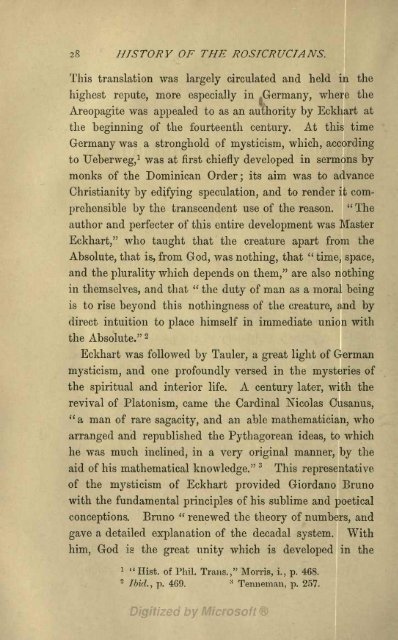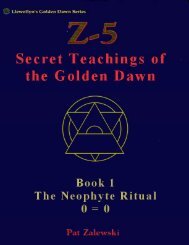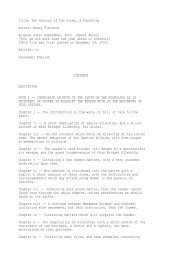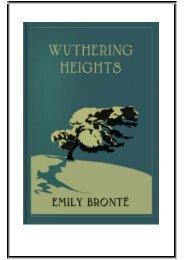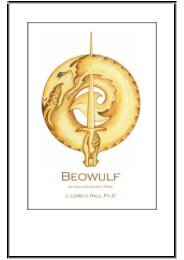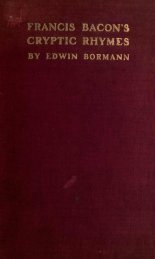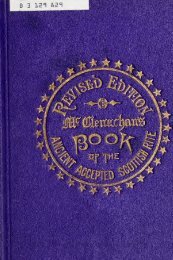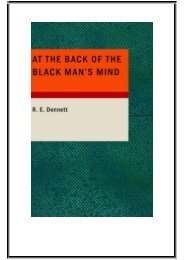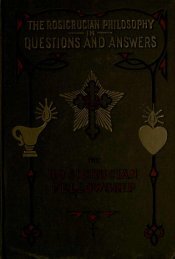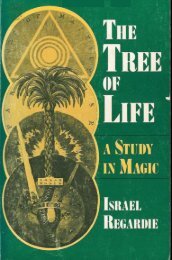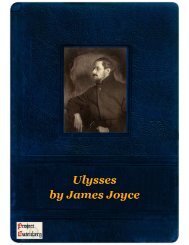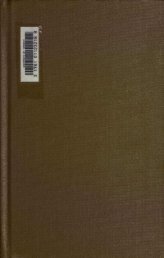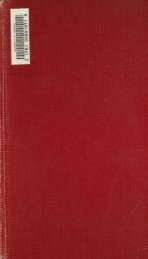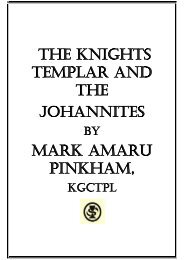- Page 2: ftmtj Presented to the LIBRARY of t
- Page 7: THE REAL HISTORY OF THE ROSICRUCIAN
- Page 10 and 11: vi ANALYSIS OF CONTENTS. CHAPTER TH
- Page 12 and 13: Vlll ANAL YS1S OF CONTENTS. CHAPTER
- Page 14 and 15: 2 HISTORY OF THE ROSICRUCIANS. inde
- Page 16 and 17: HISTORY OF THE ROSICRUCIANS. in dis
- Page 18 and 19: 6 HISTORY OF THE ROSICRUCIANS. dige
- Page 20 and 21: 8 HISTORY OF THE ROSICRUCIANS. mono
- Page 22 and 23: io HISTORY OF THE ROSICRUCTANS. lil
- Page 24 and 25: 12 HISTORY OF THE ROSICRUCIANS. Gno
- Page 26 and 27: 14 HISTORY OF THE ROSICRUCIANS. Le
- Page 28 and 29: 1 6 HISTORY OF THE ROSICRUCIANS. In
- Page 30 and 31: i8 HISTORY OF THE ROSICRUCIANS. Ros
- Page 32 and 33: 20 HISTORY OF THE ROSICRUCIANS. The
- Page 34 and 35: 22 HISTORY OF THE ROSICRUCIANS. tre
- Page 36 and 37: 24 HISTORY OF THE ROSICRUCIANS. asc
- Page 39: HISTOKY OF THE KOSICRUCIANS. CHAPTE
- Page 43 and 44: MYSTICAL PHILOSOPHY IN GERMANY. 31
- Page 45 and 46: MYSTICAL PHILOSOPHY IN GERMANY. 33
- Page 47 and 48: THE PROPHECY OF PARACELSUS. 35 sury
- Page 49 and 50: THE UNIVERSAL REFORMATION. 37 by th
- Page 51 and 52: THE UNIVERSAL REFORMATION. 39 to re
- Page 53 and 54: THE UNIVERSAL REFORMATION. 41 conve
- Page 55 and 56: THE UNIVERSAL REFORMATION. 43 God's
- Page 57 and 58: THE UNIVERSAL REFORMATION. 43 God's
- Page 59 and 60: THE UNIVERSAL REFORMATION. 47 cause
- Page 61 and 62: THE UNIVERSAL REFORMATION. 49 Thus
- Page 63 and 64: THE UNIVERSAL REFORMATION. 51 mind
- Page 65 and 66: THE UNIVERSAL REFORMATION. 53 ambit
- Page 67 and 68: THEiUNIVERSAL REFORMATION. 55 great
- Page 69 and 70: THE UNIVERSAL REFORMATION. 57 find
- Page 71 and 72: THE UNIVERSAL REFORMATION. 59 stati
- Page 73 and 74: THE UNIVERSAL REFORMATION. 61 my to
- Page 75 and 76: THE UNIVERSAL REFORMATION. 63 taken
- Page 77 and 78: FAMA FRATERNITATIS. 65 Fama Fratern
- Page 79 and 80: FAMA FRATERNITATIS. 67 He was but o
- Page 81 and 82: FAMA FRATERNITATIS. 69 studies acco
- Page 83 and 84: FAMA FRATERNITATIS. 1\ but speciall
- Page 85 and 86: FAMA FRATERN1TATIS. 73 Their agreem
- Page 87 and 88: FAMA FRATERNITATIS. 75 were the lat
- Page 89 and 90: FAMA FRATERNITATIS. 7 7 In the morn
- Page 91 and 92:
FAMA FRATERNITATIS. 79 which next u
- Page 93 and 94:
FAMA FRATERNITATIS. 81 it is fittin
- Page 95 and 96:
FAMA FRATERNITATIS. 83 with our lov
- Page 97 and 98:
CHAPTER IV. THE CONFESSION OF THE R
- Page 99 and 100:
CONFESSION OF ROSICRUCIAN FRATERNIT
- Page 101 and 102:
CONFESSION OF ROSICRUCIAN FRATERNIT
- Page 103 and 104:
CONFESSION OF ROSICRUCIAN FRA TERNI
- Page 105 and 106:
CONFESSION OF ROSICRUCIAN FRATERNIT
- Page 107 and 108:
CONFESSION OF ROSICRUCIAN FRATERNIT
- Page 109 and 110:
CONFESSION OF ROSICRUCIAN FRA7ERNIT
- Page 111 and 112:
CHAPTER V. THE CHYMICAL MARRIAGE OF
- Page 113 and 114:
MARRIAGE OF CHRISTIAN ROSENCREUTZ.
- Page 115 and 116:
MARRIAGE OF CHRISTIAN ROSENCREUTZ.
- Page 117 and 118:
MARRIAGE OF CHRISTIAN ROSENCREUTZ.
- Page 119 and 120:
MARRIAGE OF CHRISTIAN ROSENCREUTZ.
- Page 121 and 122:
MARRIAGE OF CHRISTIAN ROSENCREUTZ.
- Page 123 and 124:
MARRIAGE OF CHRISTIAN ROSENCREUTZ.
- Page 125 and 126:
MARRIAGE OF CHRISTIAN ROSENCREUTZ.
- Page 127 and 128:
MARRIAGE OF CHRISTIAN ROSENCREUTZ.
- Page 129 and 130:
MARRIAGE OF CHRISTIAN ROSENCREUTZ.
- Page 131 and 132:
MARRIAGE OF CHRISTIAN ROSENCREUTZ.
- Page 133 and 134:
MARRIAGE OF CHRISTIAN ROSENCREUTZ.
- Page 135 and 136:
MARRIAGE OF CHRISTIAN ROSENCREUTZ.
- Page 137 and 138:
MARRIAGE OF CHRISTIAN ROSENCREUTZ.
- Page 139 and 140:
MARRIAGE OF CHRISTIAN ROSENCREUTZ.
- Page 141 and 142:
MARRIAGE OF CHRISTIAN ROSENCREUTZ.
- Page 143 and 144:
MARRIAGE OF CHRISTIAN ROSENCREUTZ.
- Page 145 and 146:
MARRIAGE OF CHRISTIAN ROSENCREUTZ.
- Page 147 and 148:
MARRIAGE OF CHRISTIAN ROSENCREUTZ.
- Page 149 and 150:
MARRIAGE OF CHRISTIAN ROSENCREUTZ.
- Page 151 and 152:
MARRIAGE OF CHRISTIAN ROSENCREUTZ.
- Page 153 and 154:
MARRIAGE OF CHRISTIAN ROSENCREUTZ.
- Page 155 and 156:
MARRIAGE OF CHRISTIAN ROSENCREUTZ.
- Page 157 and 158:
MARRIAGE OF CHRISTIAN ROSENCREUTZ.
- Page 159 and 160:
MARRIAGE OF CHRISTIAN ROSENCREUTZ.
- Page 161 and 162:
MARRIAGE OF CHRISTIAN ROSENCREUTZ.
- Page 163 and 164:
MARRIAGE OF CHRISTIAN ROSENCREUTZ.
- Page 165 and 166:
MARRIAGE OF CHRISTIAN ROSENCREUTZ.
- Page 167 and 168:
MARRIAGE OF CHRISTIAN ROSENCREUTZ.
- Page 169 and 170:
MARRIAGE OF CHRISTIAN ROSENCREUTZ.
- Page 171 and 172:
MARRIAGE OF CHRISTIAN ROSENCREUTZ.
- Page 173 and 174:
MARRIAGE OF CHRISTIAN ROSENCREUTZ.
- Page 175 and 176:
MARRIAGE OF CHRISTIAN ROSENCREUTZ.
- Page 177 and 178:
MARRIAGE OF CHRISTIAN ROSENCREUTZ.
- Page 179 and 180:
MARRIAGE OF CHRISTIAN ROSENCREUTZ.
- Page 181 and 182:
MARRIAGE OF CHRISTIAN ROSENCREUTZ.
- Page 183 and 184:
MARRIAGE OF CHRISTIAN ROSENCREUTZ.
- Page 185 and 186:
MARRIAGE OF CHRISTIAN ROSENCREUTZ.
- Page 187 and 188:
MARRIAGE OF CHRISTIAN ROSENCREUTZ.
- Page 189 and 190:
MARRIAGE OF CHRISTIAN ROSENCREUTZ.
- Page 191 and 192:
MARRIAGE OF CHRISTIAN ROSENCREUTZ.
- Page 193 and 194:
MARRIAGE OF CHRISTIAN ROSENCREUTZ.
- Page 195 and 196:
MARRIAGE OF CHRISTIAN ROSENCREUTZ.
- Page 197 and 198:
MARRIAGE OF CHRISTIAN ROSENCREUTZ.
- Page 199 and 200:
MARRIAGE OF CHRISTIAN ROSENCREUTZ.
- Page 201 and 202:
MARRIAGE OF CHRISTIAN ROSENCREUTZ.
- Page 203 and 204:
MARRIAGE OF CHRISTIAN ROSENCREUTZ.
- Page 205 and 206:
MARRIAGE OF CHRISTIAN ROSENCREUTZ.
- Page 207 and 208:
MARRIAGE OF CHRISTIAN ROSENCREUTZ.
- Page 209 and 210:
CHAPTER VI. ON THE CONNECTION OF TH
- Page 211 and 212:
ROS1CRUCIANISM, ALCHEMY, AND MAGIC.
- Page 213 and 214:
ROSICRUCIANISM, ALCHEMY, AND MAGIC.
- Page 215 and 216:
ROSICRUC1ANISM, ALCHEMY, AND MAGIC.
- Page 217 and 218:
ROSICRUCIANISM, ALCHEMY, AND MAGIC.
- Page 219 and 220:
ROSICRUC1ANISM, ALCHEMY, AND MAGIC.
- Page 221 and 222:
ROSICRUCIANISM, ALCHEMY, AND MAGIC.
- Page 223 and 224:
ANTIQUITY OF ROSICRUCIAN FRATERNITY
- Page 225 and 226:
ANTIQUITY OF ROSICRUCIAN FRATERNITY
- Page 227 and 228:
ANTIQUITY OF ROSICRUCIAN FRATERNITY
- Page 229 and 230:
ARSIS OF ANDKEAS. CHAPTER VIII. THE
- Page 231 and 232:
THE CASE OFJOHANN VALENTIN ANDREAS.
- Page 233 and 234:
THE CASE OFJOHANN VALENTIN ANDREAS.
- Page 235 and 236:
THE CASE OF JOHANN VALENTIN ANDREAS
- Page 237 and 238:
THE CASE OF JOHANN VALENTIN ANDREAS
- Page 239 and 240:
. its THE CASE OF JOHANN VALENTIN A
- Page 241 and 242:
THE CASE OFJOHANN VALENTIN ANDREAS.
- Page 243 and 244:
THE CASE OFJOHANN VALENTIN ANDREAS.
- Page 245 and 246:
THE CASE OFJOHANN VALENTIN ANDREAS.
- Page 247 and 248:
THE CASE OFJOHANN VALENTIN ANDREAS.
- Page 249 and 250:
THE CASE OF JOHANN VALENTIN ANDREAS
- Page 251 and 252:
THE CASE OF JOHANN VALENTIN ANDREAS
- Page 253 and 254:
THE CASE OF JOHANN VALENTIN ANDREAS
- Page 255 and 256:
THE CASE OF JOHANN VALENTIN ANDREAS
- Page 257 and 258:
THE CASE OF JOHANN VALENTIN ANDREAS
- Page 259 and 260:
PROGRESS OF ROSICRUCIANISM IN GERMA
- Page 261 and 262:
PROGRESS OF ROSICRUCIANISM IN GERMA
- Page 263 and 264:
PROGRESS OF ROSICRUCIANISM IN GERMA
- Page 265 and 266:
PROGRESS OF ROS1CRUCIANTSM IN GERMA
- Page 267 and 268:
PROGRESS OF ROSICRUCIANISM IN GERMA
- Page 269 and 270:
PROGRESS OF ROSICRUCIAN1SM IN GERMA
- Page 271 and 272:
PROGRESS OF ROSICRUCIANISM IN GERMA
- Page 273 and 274:
PROGRESS OF ROSICRUCIANISM IN GERMA
- Page 275 and 276:
PROGRESS OF ROSICRUCIANISM IN GERMA
- Page 277 and 278:
PROGRESS OF ROSICRUCIANISM IN GERMA
- Page 279 and 280:
PROGRESS OF ROS1CRUCIANISM IN GERMA
- Page 281 and 282:
ROSTCRUCIAN APOLOGISTS: MICHAEL MAI
- Page 283 and 284:
ROSICRUCIAN APOLOGISTS: MICHAEL MAI
- Page 285 and 286:
ROSICRUCIAN APOLOGISTS: MICHAEL MAI
- Page 287 and 288:
ROSICRUC1AN APOLOGISTS: MICHAEL MAI
- Page 289 and 290:
ROSICRUCIAN APOLOGISTS : MICHAEL MA
- Page 291 and 292:
ROSICRUCIAN APOLOGISTS: MICHAEL MAI
- Page 293 and 294:
ROSICRUCIAN APOLOGISTS : MICHAEL MA
- Page 295 and 296:
CHAPTER XI. ROSICRUCIAN APOLOGISTS:
- Page 297 and 298:
ROSICRUCIAN APOLOGISTS : ROBERT FLU
- Page 299 and 300:
ROSICRUCIAN APOLOGISTS : ROBERT FLU
- Page 301 and 302:
ROSICRUCIAN APOLOGISTS: ROBERT FLUD
- Page 303 and 304:
ROSICRUCIAN APOLOGISTS : ROBERT FLU
- Page 305 and 306:
ROSICRUCIAN APOLOGISTS : ROBERT FLU
- Page 307 and 308:
ROSICRUCIAN APOLOGISTS: ROBERT FLUD
- Page 309 and 310:
ROSICRUCIAN APOLOGISTS: ROBERT FLUD
- Page 311 and 312:
ROSICRUCIAN APOLOGISTS: ROBERT FLUD
- Page 313 and 314:
ROSICRUCIAN APOLOGISTS: ROBERT FLUD
- Page 315 and 316:
ROSICRUCIAN APOLOGISTS: ROBERT FLUD
- Page 317 and 318:
ROSICRUCIAN APOLOGISTS: ROBERT FLUD
- Page 319 and 320:
ROSICRUCIAN APOLOGISTS: ROBERT FLUD
- Page 321 and 322:
THOMAS VAUGHAN, 309 when its ways a
- Page 323 and 324:
THOMAS VAUGHAN. 311 being a charita
- Page 325 and 326:
THOMAS VAUGHAN. 313 also written an
- Page 327 and 328:
CHAPTER XIII. ROSICRUCIAN APOLOGIST
- Page 329 and 330:
ROSICRUCIAN APOLOGISTS: JOHN HEYDON
- Page 331 and 332:
ROSICRUCIAN APOLOGISTS : JOHN HEYDO
- Page 333 and 334:
ROSICRUCIAN APOLOGISTS : JOHN HEYDO
- Page 335 and 336:
ROSICRUCIAN APOLOGISTS : JOHN HEYDO
- Page 337 and 338:
ROSICRUCIAN APOLOGISTS: JOHN HEYDON
- Page 339 and 340:
ROSICRUC1AN APOLOGISTS : JOHN HEYDO
- Page 341 and 342:
ROSICRUCIAN APOLOGISTS : JOHN HEYDO
- Page 343 and 344:
ROSICRUCIAN APOLOGISTS: JOHN HEYDON
- Page 345 and 346:
ROSICRUCIAN APOLOGISTS : JOHN HE YD
- Page 347 and 348:
ROSICRUCIAN APOLOGISTS ; JOHN HE YD
- Page 349 and 350:
ROSICRUCIAN APOLOGISTS: JOHN HEYDON
- Page 351 and 352:
ROSICRUCIAN APOLOGISTS : JOHN HEYDO
- Page 353 and 354:
ROSICRUCIAN APOLOGISTS: JOHN HEYDON
- Page 355 and 356:
ROSICRUCIAN APOLOGISTS : JOHN HEYDO
- Page 357 and 358:
ROSICRUCIAN APOLOGISTS : JOHN HEYDO
- Page 359 and 360:
ROSICRUCIAN APOLOGISTS : JOHN HEYDO
- Page 361 and 362:
ROSICRUCIAN APOLOGISTS : JOHN HEYDO
- Page 363 and 364:
ROSICRUCIAN APOLOGISTS: JOHN HEYDON
- Page 365 and 366:
ROSJCRUC1AN APOLOGISTS : JOHN HEYDO
- Page 367 and 368:
ROSICRUCIAN APOLOGISTS : JOHN HE YD
- Page 369 and 370:
ROSICRUCIAN APOLOGISTS : JOHN HEYDO
- Page 371 and 372:
ROSICRUCIAN APOLOGISTS : JOHN HEYDO
- Page 373 and 374:
ROSICRUCIAN APOLOGISTS : JOHN HE YD
- Page 375 and 376:
ROSICRUCIAN APOLOGISTS : JOHN HEYDO
- Page 377 and 378:
ROSICRUCIAN APOLOGISTS : JOHN HEYDO
- Page 379 and 380:
nOSICRUCIAN APOLOGISTS : JOHN HEYDO
- Page 381 and 382:
ROSICRUCIAN APOLOGISTS : JOHN HEYDO
- Page 383 and 384:
ROSICRUCIAN APOLOGISTS: JOHN HEYDON
- Page 385 and 386:
ROSTCRUC1AN APOLOGISTS: JOHN HEYDON
- Page 387 and 388:
ROSICRUCIAN APOLOGISTS: JOHN HEYDON
- Page 389 and 390:
ROSICRUCIAN APOLOGISTS: JOHN HEYDON
- Page 391 and 392:
ROSICRUCIAN APOLOGISTS: JOHN HEYDON
- Page 393 and 394:
ROS1CRUCIAN APOLOGISTS: JOHN HEYDON
- Page 395 and 396:
ROSICRUCIAN APOLOGISTS: JOHN HEYDON
- Page 397 and 398:
ROSICRUCIAN APOLOGISTS : JOHN HEYDO
- Page 399 and 400:
CHAPTER XIV. ROSICRUCIANISM IN FRAN
- Page 401 and 402:
ROSICRUCIANISM IN FRANCE. 389 and w
- Page 403 and 404:
ROSICRUCIAN1SM IN FRANCE. 391 place
- Page 405 and 406:
ROSICRUCIANISM IN FRANCE. 393 Invis
- Page 407 and 408:
ROSICRUCIANISM IN FRANCE. 395 conta
- Page 409 and 410:
ROSICRUCIANISM IN FRANCE. 397 and n
- Page 411 and 412:
ROSICRUCIANISM IN FRANCE. 399 " Tha
- Page 413 and 414:
ROSICRUCIANISM IN FRANCE. 401 indiv
- Page 415 and 416:
ROSICRUCIANS AND FREEMASONS. 403 mu
- Page 417 and 418:
ROSICRUCIANS AND FREEMASONS. 405 se
- Page 419 and 420:
ROSfCRUClANS AND FREEMASONS. 407 th
- Page 421 and 422:
MODERN ROSICRUCIAN SOCIETIES. 409 C
- Page 423 and 424:
MODERN ROSICRUCIAN SOCIETIES. 411 p
- Page 425 and 426:
MODERN ROSICRUCIAN SOCIETIES. 413 o
- Page 427 and 428:
MODERN ROSICRUCIAN SOCIETIES. 415 a
- Page 429 and 430:
MODERN ROSICRUCIAN SOCIETIES. 417 a
- Page 431 and 432:
MODERN ROSICRUCIAN SOCIETIES. 419 I
- Page 433 and 434:
MODERN ROSICRUCIAN SOCIETIES. 421 J
- Page 435 and 436:
MODERN ROSICRUCIAN SOCIETIES. 423 m
- Page 437 and 438:
MODERN ROSICRUCIAN SOCIETIES. 425 f
- Page 439 and 440:
MODERN ROSICRUCIAN SOCIETIES. 427 t
- Page 441 and 442:
1 ' MODERN ROSICRUCIAN SOCIETIES. 4
- Page 443 and 444:
CONCLUSION. "THERE is a point," quo
- Page 445 and 446:
CONCLUSION. 433 unencumbered by eva
- Page 447 and 448:
ADDITIONAL NOTES. 435 NUMBER II. (p
- Page 449 and 450:
ADDITIONAL NOTES. 437 1. Maria Elis
- Page 451 and 452:
ADDITIONAL NOTES. 439 than two days
- Page 453 and 454:
APPENDIX OF ADDITIONAL DOCUMENTS. 4
- Page 455 and 456:
APPENDIX OF ADDITIONAL DOCUMENTS. 4
- Page 457 and 458:
APPENDIX OF ADDITIONAL DOCUMENTS. 4


